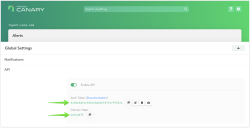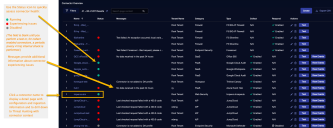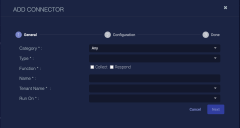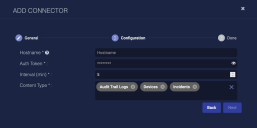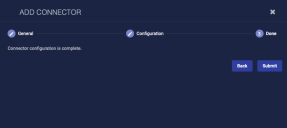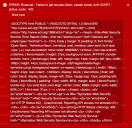Configuring Thinkst Canary Connectors
This connector allows Stellar Cyber to ingest logs from Thinkst Canary and add the records to the data lake.
Stellar Cyber connectors with the Collect function (collectors) may skip collecting some data when the ingestion volume is large, which potentially can lead to data loss. This can happen when the processing capacity of the collector is exceeded.
Connector Overview: Thinkst Canary
Capabilities
-
Collect: Yes
-
Respond: No
-
Native Alerts Mapped: No
-
Runs on: DP
-
Interval: Configurable
Collected Data
|
Content Type |
Index |
Locating Records |
|---|---|---|
|
Incidents Audit Trail Logs Devices |
Syslog Assets (for device logs only; collected every 24 hours) |
Domain
|
https:/<Hostname> where <Hostname> is a variable from the configuration of this connector |
Response Actions
N/A
Third Party Native Alert Integration Details
N/A
Required Credentials
-
Hostname (Domain Hash) and Authentication token
Let us know if you find the above overview useful.
Adding a Thinkst Canary Connector
To add a Thinkst Canary connector:
- Obtain Thinkst Canary credentials
- Add the connector in Stellar Cyber
- Test the connector
- Verify ingestion
Obtaining Thinkst Canary Credentials
Follow guidance on Thinkst Canary documentation to enable the API and generate an API token for Stellar Cyber API calls.
-
Login as an administrative user to the Thinkst Canary console.
-
Click the Gear icon and select Global Settings.
-
Click API and select Enable API.
-
Note the Auth Token and Domain Hash in the dialog box. The Auth Token is the API key to make calls. The Domain Hash identifies your Console when using the API.
-
Create the hostname for Stellar Cyber in the following format:
<domain hash>.canary.tools
Adding the Connector in Stellar Cyber
With the access information handy, you can add a Thinkst Canary connector in Stellar Cyber:
-
Log in to Stellar Cyber.
-
Click System | Integration | Connectors. The Connector Overview appears.
-
Click Create. The General tab of the Add Connector screen appears. The information on this tab cannot be changed after you add the connector.
-
Choose Honeypot from the Category drop-down.
-
Choose Thinkst Canary from the Type drop-down.
-
For this connector, the supported Function is Collect, which is enabled already.
-
Enter a Name.
This field does not accept multibyte characters.
-
Choose a Tenant Name. This identifies the tenant that is allowed to use the connector.
-
Choose the device on which to run the connector.
-
(Optional) When the Function is Collect, you can create Log Filters. For information, see Managing Log Filters.

-
Click Next. The Configuration tab appears.
The asterisk (*) indicates a required field.
-
Enter the Hostname using the information you noted above.
Do not include https in the Hostname.
-
Enter the Auth Token you noted above.
-
Choose the Interval (min). This is how often the logs are collected.
The logs for Devices are queried every 24 hours.
-
Choose the Content Type. The logs for Audit Trail Logs, Devices, and Incidents are supported.
-
Click Next. The final confirmation tab appears.
-
Click Submit.
To pull data, a connector must be added to a Data Analyzer profile if it is running on the Data Processor.
The new connector is immediately active.
Testing the Connector
When you add (or edit) a connector, we recommend that you run a test to validate the connectivity parameters you entered. (The test validates only the authentication / connectivity; it does not validate data flow).
For connectors running on a sensor, Stellar Cyber recommends that you allow 30-60 seconds for new or modified configuration details to be propagated to the sensor before performing a test.
-
Click System | Integrations | Connectors. The Connector Overview appears.
-
Locate the connector that you added, or modified, or that you want to test.
-
Click Test at the right side of that row. The test runs immediately.
Note that you may run only one test at a time.
Stellar Cyber conducts a basic connectivity test for the connector and reports a success or failure result. A successful test indicates that you entered all of the connector information correctly.
To aid troubleshooting your connector, the dialog remains open until you explicitly close it by using the X button. If the test fails, you can select the button from the same row to review and correct issues.
The connector status is updated every five (5) minutes. A successful test clears the connector status, but if issues persist, the status reverts to failed after a minute.
Repeat the test as needed.
Verifying Ingestion
To verify ingestion:
- Click Investigate | Threat Hunting. The Interflow Search tab appears.
- Change the Indices to Syslog or for the Devices content type only, change the Indices to Assets. The table immediately updates to show ingested Interflow records.
